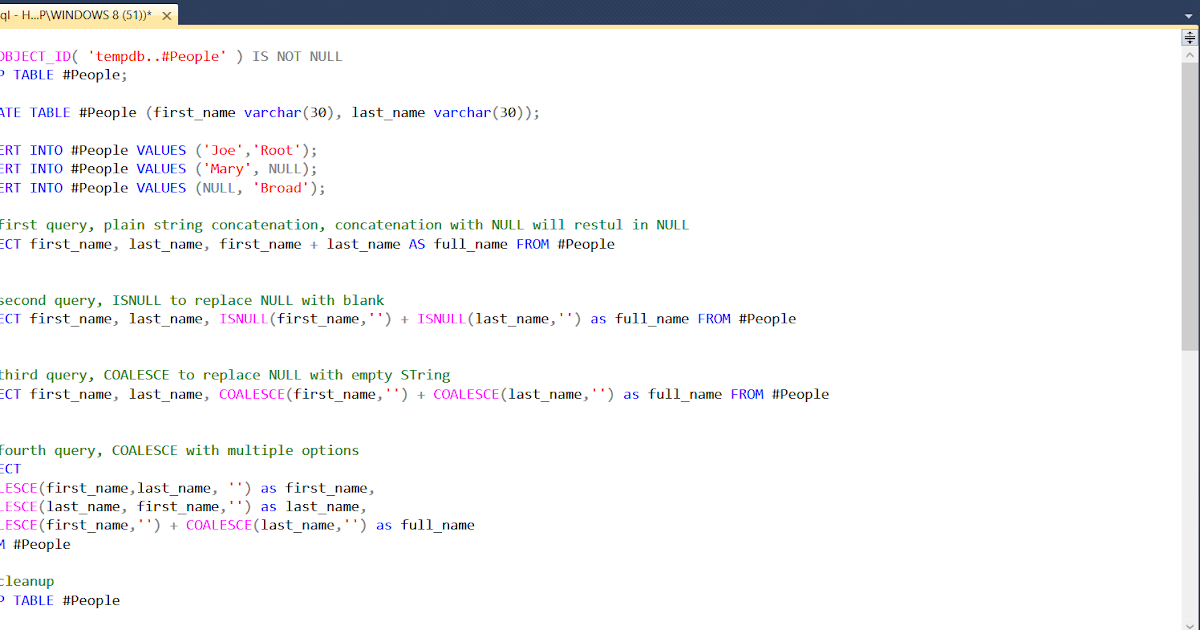

It also is not clear to me why you are inserting back into the employee table which has non usable data, rather than inserting into a new table. This assumes that your timestamp data is formatted as follows: DD/MM/YYYY HH:MI:SS PM (e.g. select coalesce (column1, 'Total') as coalescedvalue, sum (column2) as columnsum from table where yada yada group by rollup (coalescedvalue) order by coalescedvalue. insert into employee (eid,dojo) SELECT 14,coalesce (tochar (dojo,'dd-mm-yyyy'),'') from employee I have to insert into table by selecting it from table,my column dojo has not null constraint and timestamp doesn't allow '' to insert please provide an alternate for this if timestamp.
Postgresql coalesce empty string how to#
Select 14, coalesce(to_timestamp(dojo, 'DD/MM/YYYY HH:MI:SS PM'), current_timestamp) I'm trying to output and label a column total from a rollup. how to coalesce timestamp with not null constraint postgres. CREATE UNIQUE INDEX testupsertsolutionidx ON testupsert (name, status, COALESCE(testfield, '')) The empty string ('') is an obvious candidate for character types, but you can use any legal value that either never appears or can be folded with NULL according to your definition of 'unique'. It stores the costs of each service a client gets in this format " KES 0.80".

Something like the following is what I believe you intend to do: insert into employee (eid, dojo) I have a cost column in my postgres db whose type is varchar. Instead, you should be using to_timestamp(), which can parse a string and return a timestamp. The output of to_char is a string, and the way you are using it would cause Postgres to reject it. As others have pointed out, one solution would be to use current_timestamp as a placeholder.Īnother problem you have is that you are incorrectly using to_char to format your timestamp data. This won't work, because empty string is not a valid timestamp. First, you are trying to insert an empty string '' to handle NULL values in the dojo column. WHERE CASE WHEN x 0 THEN y/x > 1.Your current query has severals problems, two of which I think my answer can resolve. For example, this is a possible way of avoiding a division-by-zero failure: When the input is a non-NULL string, Oracle DECODE and Orafce DECODE provide the same output. Let’s test the DECODE function provided by the Orafce extension with different types of input parameters and learn how to correctly handle empty strings. The example above can be written using the simple CASE syntax:Ī CASE expression does not evaluate any subexpressions that are not needed to determine the result. Option 2: Use the Orafce DECODE function in PostgreSQL. This is similar to the switch statement in C. If no match is found, the result of the ELSE clause (or a null value) is returned. The first expression is computed, then compared to each of the value expressions in the WHEN clauses until one is found that is equal to it.


There is a “ simple” form of CASE expression that is a variant of the general form above: The data types of all the result expressions must be convertible to a single output type. If the ELSE clause is omitted and no condition is true, the result is null. If no WHEN condition yields true, the value of the CASE expression is the result of the ELSE clause. If the condition's result is not true, any subsequent WHEN clauses are examined in the same manner. If the condition's result is true, the value of the CASE expression is the result that follows the condition, and the remainder of the CASE expression is not processed.
Postgresql coalesce empty string code#
Each condition is an expression that returns a boolean result. To achieve this, we can use the COALESCE function as follows: SELECT COALESCE (excerpt, LEFT ( CONTENT, 150 )) FROM posts Code language: SQL (Structured Query Language) (sql) PostgreSQL COALESCE example Let’s take a look at an example of using COALESCE function. The SQL CASE expression is a generic conditional expression, similar to if/else statements in other programming languages:ĬASE clauses can be used wherever an expression is valid.


 0 kommentar(er)
0 kommentar(er)
